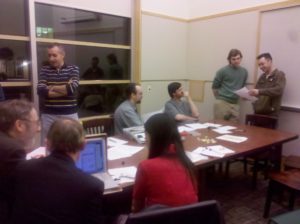One rainy Seattle evening, I found myself stuck in the frustrating situation of learning how to manage particles in XNA framework and subsequently crashing my programs. I realized I didn’t have very many friends to talk to about it and decided to make some. On 09/09/09, I started a meetup group on Meetup.com creatively called “Seattle/Eastside Game Dev” (I wanted to bridge the Lake Washington gap between east and west, on commonly understood to leave developers behind).
Our first meetup took place on September 30, using a free trial meeting room from Thinkspace in Redmond. I soon discovered that city libraries offered complimentary meeting rooms if one booked time in advance, so I scheduled meetups accordingly. The community grew quickly, more so than I could manage myself; by December 2010 we had 20 meetups, a few hundred members, and I found myself overwhelmed. A nice colleague from Microsoft, Alex Schearer, offered his help and we changed the name to Seattle Games Cooperative. He even coordinated a logo (and many other things).

The original thoughts behind the meetup involved having a grassroots-feeling group that didn’t have any corporate involvement – this was intended for people who wanted to be game makers, but never had professional experience in it. I wanted it to feel like an approachable place for anyone to contribute and share their ideas about the art of making video games. I sometimes kicked things off by sharing a bit of code I was stuck on, asking for technical feedback from my new colleagues, and getting people talking about efficient code and prior experiences (while helping me fix my crashy stuff).
I wanted to demonstrate that it was okay to show mistakes, because that’s part of the learning process. If we could work on solving each other’s puzzles and making discoveries along the way as a group/team, I felt it could be a good thing. I encouraged members to offer demonstrations of discoveries they made in their game development practice, and they did so beautifully.
Sometimes we just had meetups in restaurants to chat, growing the game dev family and creating a sense of inclusion for people at all levels of technical and professional development who might have not had a central “group” to go to (most existing meetups at that time had been aimed at industry professionals who already had a wealth of resources at their jobs – there were Seattle game industry beer meets and conferences that covered game dev topics at a high level, but the “beginner/middle ground” was missing).

We started to get support from organizers at DigiPen, who were sending students to the group – they offered us lab space for meetups, which had been difficult to manage consistently via library bookings. Things were taking off!
By early 2011, I had a full time Tech Evangelist position at Microsoft, after which my group coordinating ability outside of work went to shambles, and stayed as such for many years thereafter. I’m incredibly grateful Alex took care of the rest and made it into something more real than I imagined possible. He had the organizational strength and ability to identify weaknesses in group operations and take it to the level it needed to go.
The group is something different now, a thing I can’t say I’m a part of, which is great. This is Alex’s baby.
Much like the Vivarium Project, the thing it is now isn’t what it was then – an indicator of evolution and life. I’m excited to see how it grows and I’ll always be a Seattle Indies fan.